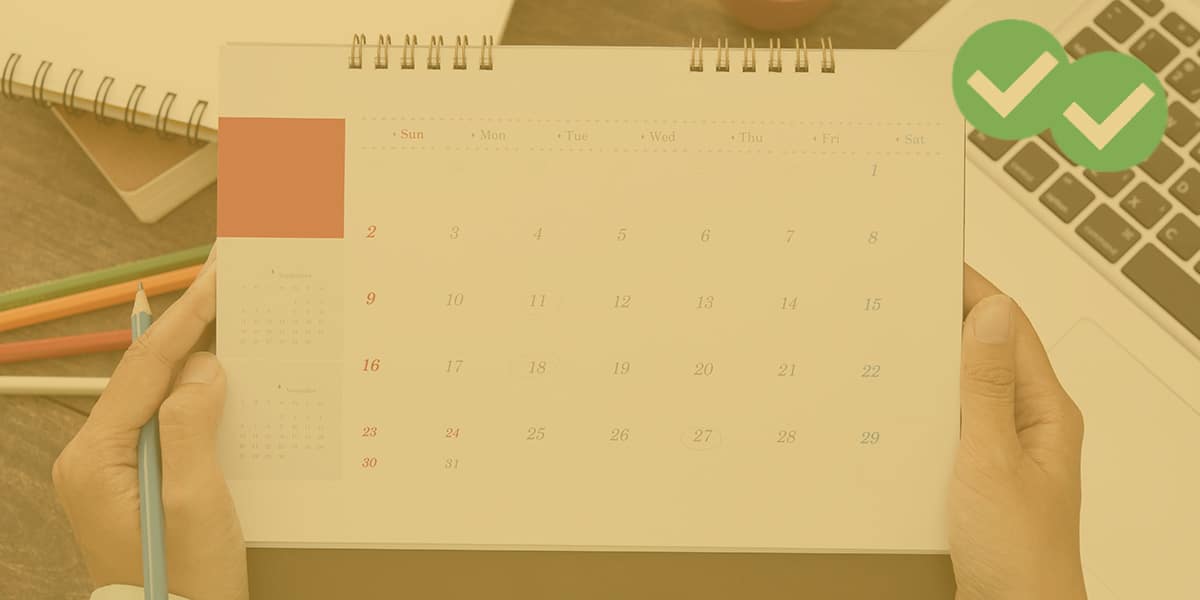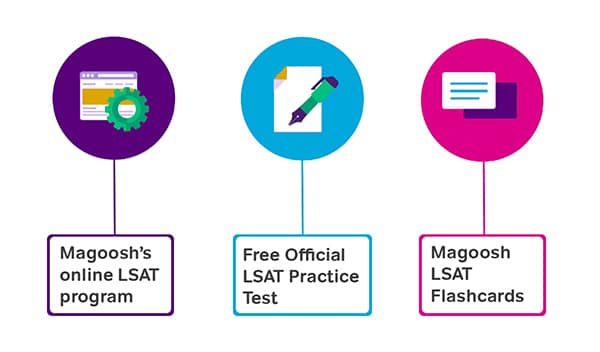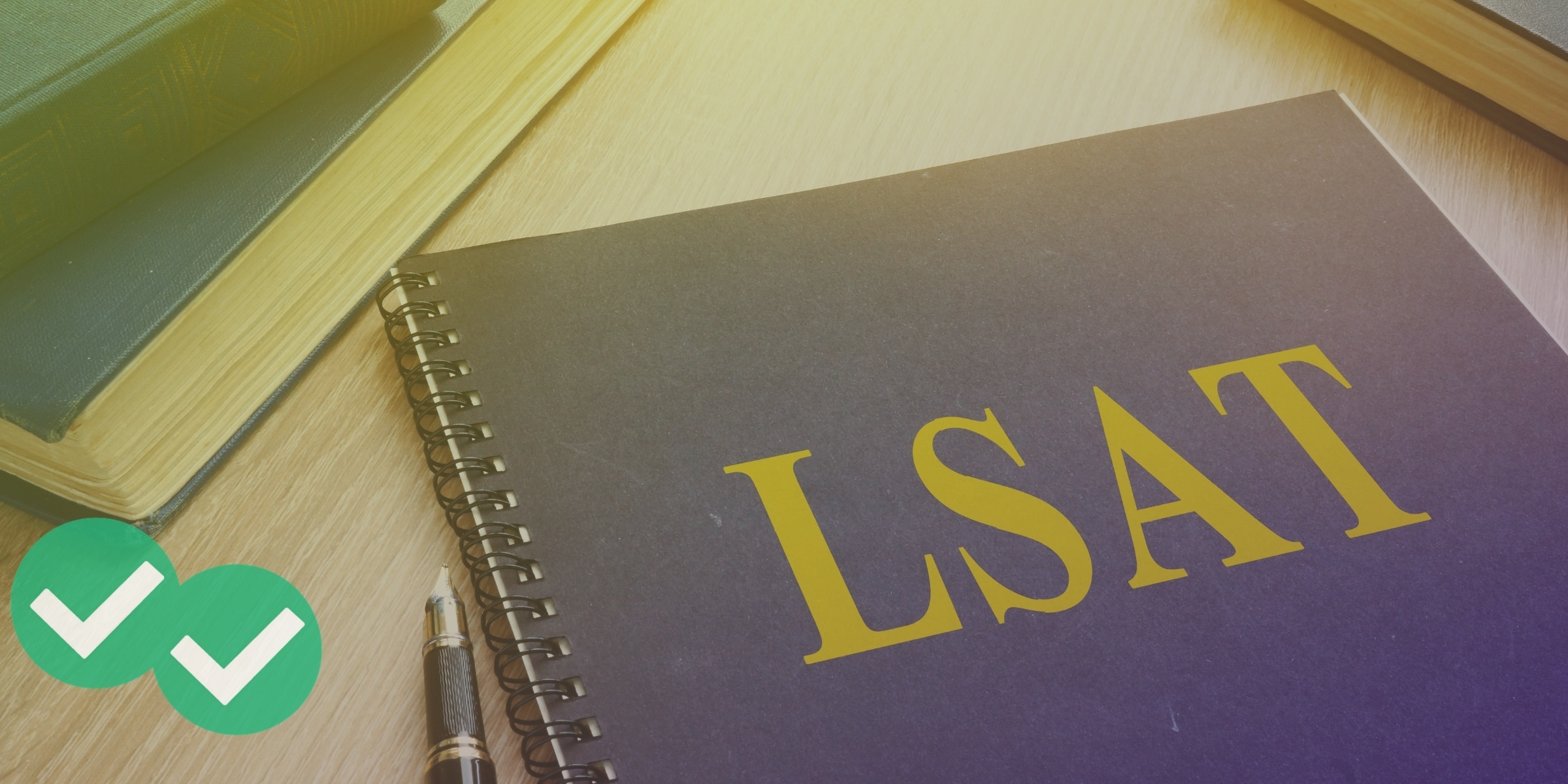
If you have a month to prepare for the LSAT, figuring out where to start can be overwhelming. If you’re starting with no prep, you’ll need a great one month LSAT study plan, time to devote to LSAT study, and dedication. Ready to make the most of the time you have before your test? Let’s go!
Download the Study Schedule as a PDF
For the updated LSAT in 2024, please view the PDF below:
What follows in this article is the study schedule for the pre-2024 LSAT.
Table of Contents
How to Use This One Month Study Schedule for the Pre-2024 LSAT
We’ve designed this study plan for test-takers who can devote themselves to studying about half time (4-5 hours a day, 5-6 days a week) for the LSAT over the course of the month. If you’re only half-hearted about LSAT prep, this guide probably isn’t for you: the schedule takes you through all LSAT sections in detail, as well as providing plenty of practice.
This one month LSAT study plan assumes you’ll have about half of each day to study, most days of the week. We’ve scheduled in 1-2 days each week for rest. Overall, the plan will help you build stamina for the test as well as develop and retain the content and strategy knowledge you’ll need to ace it.
Depending on what else is happening in your life, this commitment might not be right for you. Taking longer to prepare for the LSAT, even if you need to reschedule your LSAT test date, might be the best choice in this situation.
- If you have the time, use a three-month or six-month plan.
However, if delaying your LSAT test date is not an option…
Is It Possible to Study for the LSAT in a Month?
Yes, it’s possible! It’s not ideal, particularly if you’re looking for a big score bump, but a detailed, short LSAT study plan like this one can help get you there. In other words, one month is enough time to improve your LSAT score, but not enough time to maximize your score.
The LSAT is a very difficult exam. To perform well on test day, you’ll need to be disciplined and dedicate 4–5 hours a day, 5–6 days a week. Use this one-month LSAT study schedule to get up to speed quickly and build confidence for test day.
If you have the time to prepare over the next four weeks, here’s a plan that will help you get the most out of your study time. The schedule is laid out for you week by week and includes primary goals and a game plan for each week. The game plan sets out which Magoosh lessons to watch, the estimated time for each lesson, and when to take practice exams and do practice problems.
- While you’ll be devoting a lot of time to your LSAT prep this month, keep in mind that you’ll need 8+ hours of sleep every night throughout the 1 month LSAT study plan. Memory encoding takes place in REM sleep, so this is key to retaining what you’ve learned!
To fully complete this plan, you’ll need about 20 hours a week and 4-5 study days a week. Prepping for the LSAT in one month is not for the faint of heart!
However, that being said, we know life happens. If you are here because you have found yourself with one month to go until the LSAT, but 20 hours a week is unrealistic for you, don’t be discouraged, we can still help!
What if You Don’t Have 20-30 Hours to Study Each Week?
During each week below, you’ll find a list of top priorities. If you focus on those top priorities, you can cut your workload down to around 10 hours a week and still see a score improvement. In general, if you are short on available time in the coming month, focus on watching the Magoosh lessons, completing at least three to four practice sections a week reinforcing the lesson content, and taking one practice test a week (in one sitting).
Make sure you carefully review the questions you got wrong and why you got them wrong on your practice tests so you have the best shot at improvement. Also, pay close attention to our lessons on Goal Setting and Pacing Strategy. Many people struggle with the LSAT because of the time pressure, and they rush through games or passages and make careless mistakes.
We find that students can improve their score by, say, focusing all their time on only 3 of the 4 logic games rather than attempting all 4. If you are short on study time, think about how you want to manage your time early on and stick to that in further practice.
Essential Materials

- Subscription to Magoosh’s online LSAT program
- In addition to hundreds of lessons and video explanations, a Magoosh LSAT subscription includes access to LawHub Advantage™, a library of over 70 official, digital practice tests!
- We recommend you use Magoosh and LawHub Advantage for all of your practice, as the computer-based format will most closely mimic your actual test day experience. If you absolutely need a more economical option for official practice tests, you can purchase books of old official exams on the LSAC® site or on Amazon.
- Free Official LSAT Practice Test with Full Explanations
- Magoosh LSAT Flashcards
Using Official LSAT PrepTests with the LSAT Crash Course
In the schedule below, we sometimes recommend taking disclosed, previously-administered official exams, called PrepTests. If you’ve already taken the specific PrepTest recommended, no worries, just sub in another! As a general rule of thumb, take tests that are more recent (PrepTest 71 and above) as the LSAT does change subtly over time. However, some older PrepTests can be emblematic for certain Logic Games types. You can see our recommendations for Logic Games to practice with here.
Abbreviations Used in This Plan
- LG = Logic Games
- LR = Logical Reasoning
- RC = Reading Comprehension
- LHA = LawHub Advantage account (bundled with Magoosh LSAT Prep)
- PT = PrepTest (an officially released, previously administered LSAT test)
Should I Complete LSAT Writing After My One Month LSAT Study Plan?
You’ll take the writing section of the LSAT at a different time from the core LSAT test itself. With that said, law schools do require and look at this part of the test, and you’ll need to finish it before you can get your LSAT scores. However, because time is limited, our suggestion would be to prep for the Writing exam after you take the core LSAT exam.
When that time comes, use these two Magoosh lesson videos as the basis for your LSAT exam Writing prep:
Once you have the fundamentals down, practice these skills with a few essays. You can find a free prompt in Magoosh’s lessons, another on Khan Academy, and even more in printed books of official LSAT exams.
Magoosh students with concerns about the Writing test can contact our Student Help team for support and resources!
For more free resources on LSAT Writing, see our posts on:
The One Month Study Plan for the Pre-2024 LSAT
This one month LSAT study plan is broken down by week and covers 4 weeks of prep:
- Week 1: Diagnostic Test, Intro to LSAT Sections, and Practice Test #1
- Week 2: Deep Dive Into LSAT Sections and Practice Test #2
- Week 3: Review, Timed Practice, and Practice Test #3
- Week 4: Review, Timed Practice, and Final Tweaks
Let’s get started!
One Month LSAT Study Plan: Week One
Top Priorities:
- Take a diagnostic test
- Review the fundamentals of each section of the LSAT: Logic Games, Logical Reasoning, and Reading Comprehension using Magoosh lessons
- Take your first real practice test
- *Note: An asterisk indicates that this resource is free to students with a free trial of Magoosh—sign up here for a free trial!
To access all of other lessons and practice, you will need to purchase a Magoosh account.
Click here for a surprise!
If you want to sign up for Magoosh today, use this coupon code at checkout for 10% off! Enter the code lsatstudyplan10 at checkout to get 10% off any Magoosh LSAT prep.
Day 1: Diagnostic Test and Review
Take the LSAT Diagnostic Test
Take the June 2007 PT in Magoosh. (Bonus: if you are not yet a Magoosh student, you can access it and full text and video explanations for FREE here.) Time each section precisely, and complete all the sections.
Note: Your practice tests will be 35 minutes shorter than the real exam because they will not contain an Experimental section. If you prefer to mimic the actual test conditions precisely, use one section from PT 70 (found in your LHA account) during each practice test as an “Experimental” section.
Note about the LSAT-Flex: The LSAT-Flex does not contain an experimental section and it also has one fewer Logical Reasoning section. If you know you are going to be taking the LSAT-Flex, you can feel free to adjust your practice tests to match the Flex format. However, building stamina and getting extra practice is not a bad thing, so if you can, we would recommend taking full-length tests even if you are taking the Flex. Check out our video lesson “Tips for the LSAT-Flex”,* as well as our resources on this blog, including an LSAT Flex score conversion table.* Just type “LSAT-Flex” in the search bar.
After your practice test, check your answers, and calculate your score. If you added an Experimental section, don’t include that section in your score calculation. Also, don’t try to review your incorrect answers just yet.
Day 2: Intro to Logic Games
Intro to Logic Games
Watch all lessons in the “Section Scoring, Pacing, and Structure” section of the LG component of Magoosh’s LSAT program. These include:
- Intro *
- Scoring and Goal Setting *
- Pacing Strategy *
- Game Structure
- Intro to Game Types
- Intro To Sequencing Games
- Intro to Grouping Games
- Intro to Matching Games
- Intro to Rare Game Types
- Global Question Types
- Local Question Types
- Take a break and then get back into those Logic Games lessons!
Watch all of the “Formal Logic Basics” lessons and the first three lessons in the “Attacking the Games” section of LG. These lessons are titled:
- If/Then Statements and Contrapositives *
- Alternate Forms of If/Then
- Compound Statements
- General Game Strategy *
- Sequencing Setup**
- Sequencing Questions**
**The last two lessons will involve solving your first Sequencing game. Make sure to take the time to work this game out thoroughly.
Next, complete two or three sequencing games in the custom practice section of your online Magoosh account. Score the games and look over any incorrect answers.
Day 3: Intro to Logical Reasoning
Intro to Logical Reasoning
Watch all lessons in the “Section Pacing, Structure, and Strategy” section of the LR component of the Magoosh program. These include:
- Intro to LR *
- Pacing Strategy
- Question Structure
- Attacking the Questions I
- Attacking the Questions II
- Take a break before watching the next lessons!
Watch the following LR lessons:
- Necessary Assumption Questions I *
- Necessary Assumption Questions II
- Sufficient Assumption Questions
- Necessary vs. Sufficient Assumptions
- Formal Logic and Assumption Questions
- Strengthen Questions
- Weaken Questions and Causal Logic
Each of these videos contains sample questions. Make sure to pause the videos and complete the questions thoroughly as the videos instruct.
Using “custom practice” in Magoosh, complete a total of 30 assumption, strengthen, and weaken LR questions. Don’t time yourself at this point – just focus on your approach to the question. Score the questions, look over any incorrect answers, and set up your LR Error Log, where you’ll keep track of all the questions you answer incorrectly.
Day 4: Intro to Reading Comprehension
Intro to Reading Comprehension
Watch the following videos from the RC component of the Magoosh LSAT program:
Use the remainder of the day to review your diagnostic test from Week 1, watch the explanation videos, and enter questions you missed on your error logs before taking another practice test on the next study day.
Day 5: Practice Test #1
Practice Test #1
Under test-like conditions, take official PT 80, timed. (Or another practice test on Magoosh or on your LHA account if you have already taken PT 80.)
Analyze your practice test results and enter them into your RC and LR error logs.
Look for patterns in your results where you missed a bunch of questions in a row or where you didn’t perform the way you expected. Examine those areas to determine whether the problem was the result of:
- truly difficult content,
- a lapse in focus,
- poorly executed methods, or
- lack of time.
Building an Error Log
You can also start building a LG error log if you’d like. For a LG error log, you should record:
- Test number
- Section number
- Game number
- Question number
- Game type
- Question type (global vs. local)
An LG error log will help you identify which game types you struggle with most and how effectively you are building and reusing your diagrams. Those who miss mostly global questions may not be drawing detailed enough master diagrams. On the other hand, those who miss mostly local questions may be inaccurately redrawing diagrams between questions or applying local diagrams to other local questions where they are technically inapplicable.
Practice Test Analysis Tips
Remember, practice tests are like dress rehearsals. You’re trying to make things go wrong so that you can fix them before the real performance. If you notice that you made preventable mistakes on this practice test (those caused by anything other than truly difficult content), write down those mistakes along with a plan to avoid them on the real test day.
For example, if you know you lost focus halfway through an LR section, you can write down a solution like, “When I lose focus, I will put my pencil down, close my eyes, breath deeply three times, and then recite my goals and strategies for this test section. Then I can resume working on the next question using the appropriate step by step method.”
If timing was your issue, you could address it with the following solution: “If I am falling behind my pace because I am stuck on a question, I will mark the question and skip it, increase my allowed number of guesses by 1, and then return to that question at the end only if time allows.”
One Month LSAT Study Plan: Week Two
Top Priorities:
- Take a deep dive into Logical Reasoning flaws and question types through Magoosh lessons—this will go a long way towards improving your score in this section
- Develop a good understanding of the specific nature of LSAT Reading Comprehension through Magoosh lessons
- Know how to set up each of the main types of Logic Game
- Take another timed practice test and finalize your pacing strategy for the LSAT
Day 1: Logical Reasoning and Logic Games
Dive Into Logical Reasoning and Logic Games
LR:
Watch the following lessons from the LR component of Magoosh’s LSAT program:
- Flaw Questions I
- Flaw Questions II
- Flaw Questions III
- Flaw Questions IV
- Flaw Questions V
- Inference Questions
- Principle-Identify Questions
- Principle-Application Questions
- Paradox Questions
- Take a break!
Then, watch the following videos from the LG component of the Magoosh LSAT program.
LG:
Complete a few logic games in your LHA account. You can use our Logic Games to Practice resource to practice some games. Score the games, and look over any incorrect answers.
Complete 25 Logical Reasoning questions in your Magoosh account.
Day 2: Logical Reasoning and Reading Comprehension
Dive Into Logical Reasoning and Reading Comprehension
Watch the following videos from the LR component of the Magoosh LSAT program:
- Role of Statement Questions
- Method of Reasoning Questions
- Parallel Reasoning Questions
- Point of Contention Questions
Complete 5 practice questions through Magoosh custom practice for each of these question types. For each question, focus on applying a consistent approach rather than merely answering the question correctly.
Watch the following videos from the RC component of the Magoosh LSAT program:
- Detail Question II
- Inference Questions
- Comparative Passages I
- Comparative Passages II
- RC Review and Study Tips
Next, practice your approach to RC by completing a few passages through your online Magoosh account. For each passage, annotate the transitional language and write down the author’s main idea and purpose before moving to the questions. For each Comparative Reading passage, make sure to note the common scope of the passages, and where the authors’ perspectives differ within that scope. For the questions, think about whether you’re being asked for detail, theme, or structure, and try to pick an answer choice that addresses the correct level of analysis. Use the process of elimination aggressively.
Score the sections, enter incorrect answers into your error logs.
Day 3: Logical Reasoning and Logic Games
Deeper Dive Into Logical Reasoning and Logic Games
Learn about conditional, causal, and quantitative logic by watching the following lessons:
Complete 1 section of LR from any PT 60 through 69 in your LawHub Advantage account. For each question:
- Note the question type
- Apply a consistent approach by: reading the question first, then reading the argument, and paraphrasing an answer before reading the answer choices.
- Take a break!
Then, watch the following videos from the LG component of the Magoosh LSAT program:
Complete a few games from any PT 60 through 69 in your LawHub Advantage account, untimed. Score and review any questions you answered incorrectly. For any game where you missed more than 2 questions, take a few minutes to try and redraw your diagrams and rules, making sure that you set the diagram up as simple and accurate, and that you didn’t miss an opportunity for Limited Options or to incorporate rules directly into your diagrams.
Day 4: Mixed Practice
Mixed Practice
Watch the following lessons:
Complete one section of LR in custom practice in Magoosh. After the section, score it and enter incorrect answers into your LR error log.
Next, flip through the LG you have completed thus far this week. Identify whether there is a game type that consistently gives you more trouble than the others. If so, use your online practice problems to focus on that game type. Then, complete 4 Logic Games in custom practice in Magoosh (in practice mode). Attempt the games in the order you feel most confident by filtering based on game type, leaving for last the game type that you struggle with most. This approach will help you get the most points possible!
Next, analyze your RC error log to determine whether there is a particular type of passage or type of question that most challenges you. If so, plan to leave that passage type for the end, or plan to guess on a couple questions of that type. Then, complete 4 passages of RC from any PT 60 – 69 in your Official LHA account.
Now, analyze your LR error log to determine which questions you struggle with most. Be on the lookout for those questions as you complete another 25 LR questions in custom practice in Magoosh.
Review incorrect answers on the Review screen in Magoosh and enter info into your error logs. Where did you make avoidable errors with content or pacing? Where did you discover content that was extremely difficult? Are you happy with the questions on which you guessed? Or would you change your guesses, given the chance?
Now go relax for a while and get rested for your next practice test.
Day 5: Practice Test #2
Practice Test #2
Under test-like conditions, take official PT 79, timed. (Or another practice test on Magoosh or on your LHA account if you have already taken PT 79.)
After the test, score it, review your incorrect answers, and enter them into your error logs.
One Month LSAT Study Plan: Week Three
Top Priorities:
- Know your weaknesses in each section and focus on improving them
- Improve your ability to perform under pressure with timed practice sections
- Take your final practice test so you are ready to firm up your game plan for the real deal
Day 1: Review
Start Reviewing
- Map the transitional language, purpose, and main idea of at least 3 RC passages through your online account. Be sure to work on reading the passages quickly.
- Master the “If/then Statements” deck of LSAT Flashcards * and complete 10 games from the “Mini LG” deck.
- Analyze your LR error log and determine which sphere is your weakest. Then, using your LHA account, complete 25 LR questions.
- Complete one section of LG, LR, and RC untimed in your LHA account, answering every question.
- Review these three sections, identifying which question types are from each section gave you the most difficulty. Rewatch the applicable lesson for those question types if necessary, or use Magoosh’s online LSAT practice to target a small handful of practice problems of those question types.
Day 2: Comprehensive Timed Practice
Comprehensive Timed Practice
- Complete all sections of PT 72, timed. You do not need to do this all at once, as this is not a full-length practice test. Break it up, take it slowly, and review each section thoroughly (entering incorrect answers into your error log) before beginning the next section.
- Score and review the section, entering questions into your error logs where applicable.
Day 3: Flashcards and More Timed Practice
Flashcard Practice
- Master the “Logical Opposites” deck of LSAT Flashcards *
- Map the transitional language, purpose, and main idea of at least 2 passages through your online account.
- Master the “Transitional Language” deck of LSAT Flashcards * and complete another 5 games from your LHA account
- Complete all the sections of PT 78, timed. You do not need to do this all at once as this is not a full-length practice test. Break it up, take it slowly, and review each section thoroughly (entering incorrect answers into your error log) before beginning the next section.
Day 4: Even More Timed Practice
Practice Makes Perfect!
- Complete all the sections of PT 73, timed. You do not need to do this all at once, as this is not a full-length practice test. Break it up, take it slowly, and review each section thoroughly (entering incorrect answers into your error log) before beginning the next section.
Day 5: Practice Test #3
Last Practice Test
Find a quiet space where you won’t be interrupted and take any official PT you have not yet taken in either your Magoosh or LHA account timed.
Review lessons and explanations relevant to the questions you missed.
Finally, consider if you should adjust your goal for the test. You will perform better if you are confident about achieving a reasonable goal then if you are stressed about not achieving an unrealistic one.
One Month LSAT Study Plan: Week Four
Top Priorities:
- Review, review, review! Review your error logs and know how you will avoid any possible mistakes or traps
- Build confidence by practicing strengths
- Fully prepare for the logistics of test day and rest up!
Day 1: Timed Practice
Timed Practice and Flashcards
- Complete one LR section, one LG section, and one RC section, all timed either in your Magoosh account or LHA. Be sure to answer every question. For any game types or question types that are giving you trouble, rewatch the applicable lessons.
- Complete any remaining LSAT Flashcards * and review as necessary.
Day 2: Review
Focus Your Review
Start today off by diving into your error logs and your scores from this week’s timed sections. Identify 2 skills you would like to focus on from each section. These skills could be specific question types or they could be more general skills like pacing or identifying difficult problems.
Rewatch the lessons that are most closely related to each of those skills. Then, write down a list of concrete ways to address each of those skills. If you have problems with process of elimination, a solution might be to recite common trap answer choices in your head to help you spot one. If you have problems with Assumption questions, you might want to ask yourself, “If this answer choice were false, would the conclusion still be true?” If so, that’s not the correct answer. Come up with at least one method of addressing each skill on your list.
Next, go back to your error log and work through as many of the problems on it as possible. This is your chance to revisit questions with which you struggled previously, and to apply your new methods and habits to them. This may be a frustrating process because you will only be tackling the questions you have missed in the past. Don’t get discouraged. Instead, remember that every question you get right the second time around is one you are unlikely to miss the next time you see something similar to it.
Day 3: Final Tweaks
Final Tweaks
Review your notes from last week’s practice test and review your game plan. Then, practice one LR section, one LG section, and one RC section timed, keeping everything you’ve learned in mind. If you’ve made a plan to only do 3 out of the 4 Logic Games, for example, stick to that plan. Try to execute everything as you would imagine doing it on the test.
Review your answers to these sections.
Finally, end the day on a high note with a few easy questions. Pick your strongest type of Logic Game, do a few LR questions from early in a section, and do one RC passage that you actually find interesting.
Day 4: Test Day Review
Mentally Prepare for Test Day
You have one and only one LSAT assignment for today: review your methods, strategies, and test day procedures. Make sure you can easily remember each of the following:
- Your overall score goal for the exam, and roughly how many questions you need to answer correctly to reach it,
- How many questions you aim to answer correctly in each section,
- How many questions you are allowed to guess on in each section,
- What the different question, game, and passage types are for each section,
- Which question, game, and passage types are your strengths and which are your weaknesses,
- What to do if you panic or lose focus,
- How to get to the test center and what to bring to the test center, if you are taking the in-person LSAT. -OR- What you need to prepare in your space and are allowed to have with you, if you are taking the LSAT-Flex.*
If you can easily recite the answers to all of these questions, you are prepared to do your best on this exam given your current mastery of the content. So, once you’ve got the above stuff memorized, go relax. You’ve earned it!
Day 5: Test Day!
Test Day is Here!
It’s test day, which means no last-minute prep! Do some light exercise, eat well, and give yourself plenty of time to get to the test center if you are taking the in-person LSAT. Make sure your at-home setup is ready to go, and double-check your tech and internet bandwidth if you are taking the LSAT-Flex.
Review your list of last-minute pointers one to two hours before the test, so you are feeling confident that you’ve put the work in and are ready to show it!













